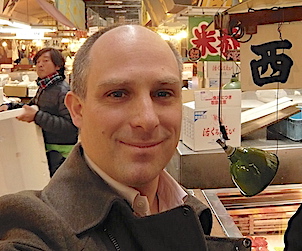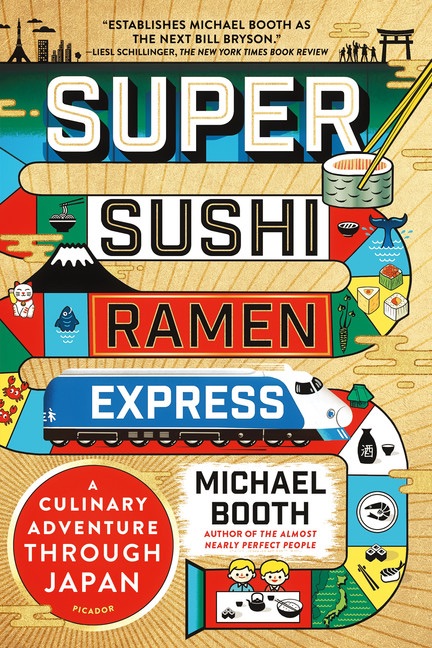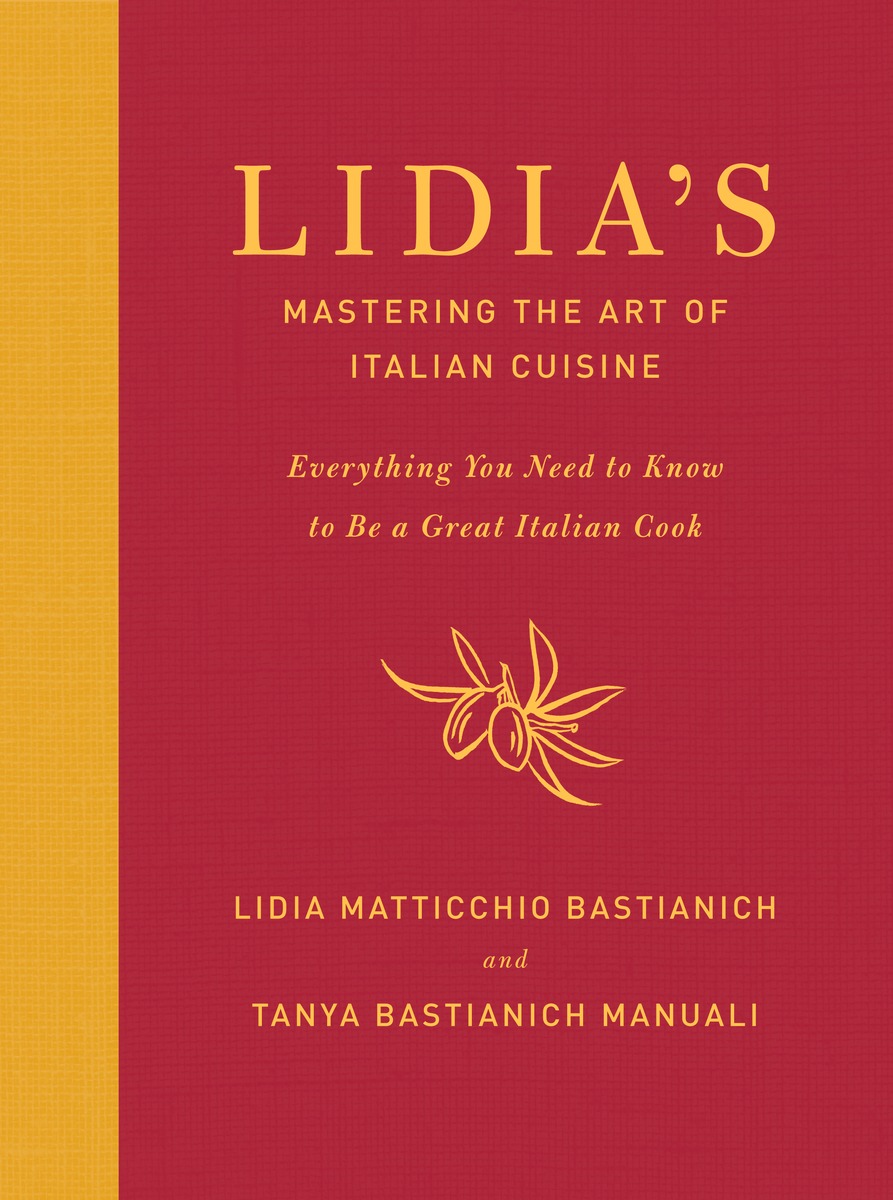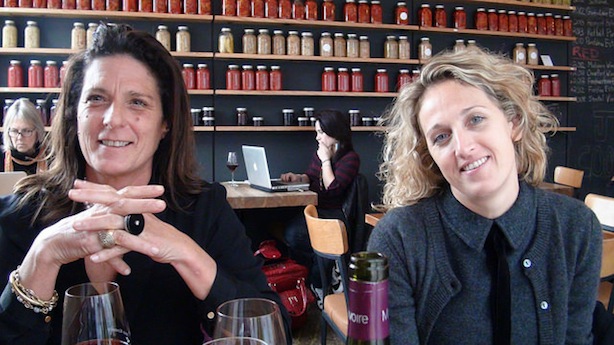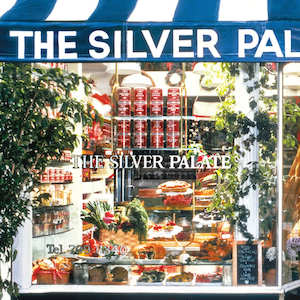Malcolm Jolley talks to author and Japanese food enthusiast Michael Booth.

Here is a cautionary note to book publishers who change the title of their books from one continent to the next. I don’t mean in translation, I mean when a book goes by one title in the UK and by another in the U.S.A. and Canada. It confuses feeble minded food journalists. Recently I read the best travelogue and food book I’d come across for a long time, believing throughout that it had just been published. I thought the book, Super Ramen Sushi Express, by the Denmark-based English writer and journalist Michael Booth, was a re-title of a book published in Britain within the last year called The Meaning of Rice. In fact, it was a paperback reprint of a book published a decade or so ago called Sushi and Beyond. I didn’t clue into my error until I had booked an interview with Michael Booth and noticed he had two books on Japan listed on his website. Oops.
Anyway, an interview booked is not a thing to be carelessly thrown away, and Super Sushi Ramen Express is a great read and a wonderful insight into the foodways of the Japanese archipelago from Hokkaido to Okinawa. Booth is a very funny author, very much in the self-depreciating participatory journalism tradition of Bill Bryson, but with much better food and drink. A great part of the charm of Super Sushi Ramen Express also comes from its cast of characters. Booth writes not only of the chefs and artisans he profiles, but also of his wife and two young sons, who he brought with him to Japan for the several months he spent eating and drinking his way through the country. However confused I may have been about the book, there was no way I was going to pass up my opportunity to talk to the author, so here’s how it all went down.
This interview has been edited for clarity, length and style.
Good Revolution: I’ve called you talk about a book called Super Sushi Ramen Express, which I had been under the impression was a relatively new book. I bought it, in fact, from a table at my local bookshop labelled ‘New & Noteworthy’. But, while it’s certainly noteworthy, I have since discovered, by checking out your website and reading the copyright page at the beginning of the book, that it’s not only new but you’ve actually just published another book on the food culture of Japan in the past year.
Michael Booth: Yes, it’s a reprint of a book called Sushi and Beyond. The North American publisher wanted to give it another name for some reason. But, that’s right: it’s an old book.
Good Revolution: Well, do you mind talking about an old book? Because it’s new to me, and suspect it would be to many of our readers.
Michael Booth: Well, this edition did just come out in North America last year, I think. So, sure. But I did just publish a new book on Japanese food and traveling in Japan, The Meaning of Rice: And Other Tales From The Belly of Japan, which is kind of like a ten year on look at Super Sushi Ramen Express. But it’s not out in North America, although I guess you could buy it as an e-book, probably. [You can, here. – Ed.]
Good Revolution: I know I saw that on your website, so that’s on my list of questions to ask you: ‘Tell me about the new book.’ But before I do, please indulge me and let me ask you a few questions about Super Sushi Ramen Express. In the book, you suggest that you went to Japan almost on a kind of dare you received from a Japanese friend. He suggested you would never understand Japanese cuisine?
Michael Booth: Yeah, that’s right. I had been studying and living in Paris. I went to the Cordon Bleu. I was really engrossed in traditional, classic French cuisine, which is fantastic and wonderful, but the side effect is that you get really, really fat if you’re greedy like me. I had a Japanese-Korean friend, Katsotoshi Kondo, who redirected me towards traditional Japanese food. I didn’t know very much about it at that time. There wasn’t that much written about it except for this one book, which had been published back in the 70’s (I think) called Japanese Cooking: a Simple Art by Shizuo Tsuji, which Toshi gave me. I started looking at it and so much of it seemed really contemporary. It was what contemporary dietary and nutritional advice was giving us: less meat, more vegetables, more fish. I had been engrossed in French cuisine for some time, and as a journalist I’m always looking for something new and completely different to dive into. What I like to do with a new subject is just completely immerse myself in it. And I had been to Japan a few years before, really loved it and was looking for a reason to go back. I had a sense that there were lots of really great food related stories. What I like to do is you food as a kind of conduit to find out about society and history and economics of a country. I think food is like ‘Route 1’ into accessing a society and a people. So, things kind of congealed around the idea of “let’s go to Japan.”. I just had the sense that Japanese cuisine especially would be a really rich field to plow in that way.
Good Revolution: Which it was, but you were not a lone wolf on this adventure. You brought your family, your wife and two small sons, which I think makes for a really interesting book. Was that a plot device or was it just because you had to?
Michael Booth: There were two reasons for that: one, I actually like my family and don’t like to be away from them, and two, my kids were that young that we had the opportunity to go without them being held back at school. And three, when you travel with kids, you see the place you’re traveling to from an extra perspective. As a journalist it’s great to have as many perspectives on where you are as possible. When you get two under tens seeing it, experiencing it, it’s a whole different angle to write about. Also, having them with us changed the way that Japanese people interacted with us. My wife is Scandinavian, so my kids were very blond at that age. When you’re in Japan with little blond kids, it’s a bit like going on a walkabout with a minor Royal. You get a lot of attention and people are really friendly. It’s just a conversation starter, in a way. That sounds like a cynical thing, but it came about mostly because I wanted us all to go together, and then it happened to have these benefits.
Good Revolution: How old were they at the time?
Michael Booth: They must have been about five and seven, something like that.
Good Revolution: Do they remember that trip?
Michael Booth: I think they do, though it’s hard to say… We’ve been back to Japan since, because of some strange things that happened that gave us the opportunity to go back. And they love Japan. You know when you speak to your kids about things that happened years ago, they can barely remember them, but I think it had a big impact on them and Japan is a big part of their lives now.
Good Revolution: I was thinking about your book this week because there was a story out of Japan trecently hat there have been fugu poisonings. A fishmonger had sold improperly prepared fugu and I think at least one or two of his customers died. The fugu chapter in the book is, I think, well representative of it: where you focus on one ingredient and find the people involved in it, in the place where it’s most celebrated. How much of your experience in the book are things you’d planned on, and how much did you just sort of discover as you went along?
Michael Booth: That’s a very good question. In terms of the fugu thing, I knew that Shimonoseki was the fugu town, so I planned to go there. I plan as much as possible; it was an expensive trip, so I wanted to make sure I got all the material I could. But, of course you also have to be flexible and take things as they come. So, I knew I was going to go to Shimonoseki, but I had no contact there and I had no idea what I would find. It was literally by coincidence that the very day I went there they were having a massive fugu festival. It was one of the more fortuitous things that happened on that trip. Other things, like having lunch with the Sumo wrestlers or meeting the TV chefs of SMAP, all had to be planned and arranged. I had a fixer who helped me. So it’s a mix of making sure that I was going to get some material and going with the flow for other aspects of the trip.
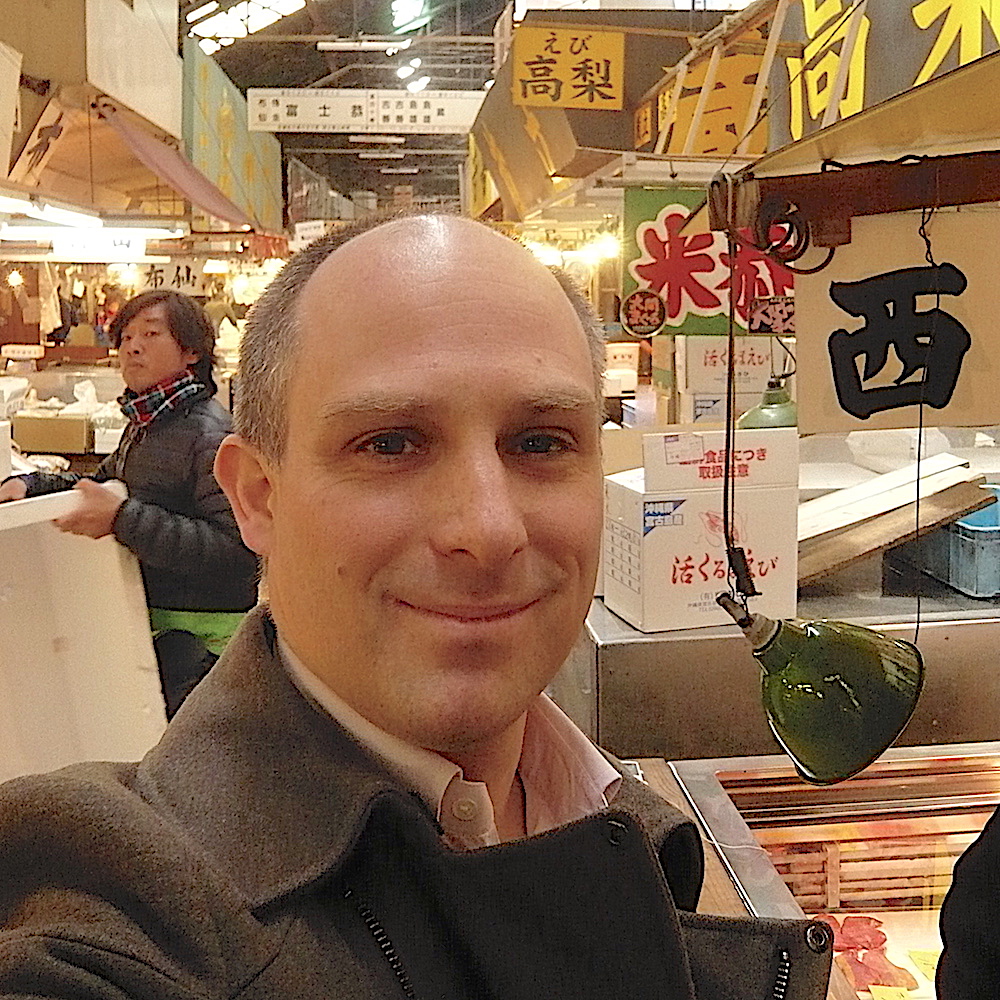
Good Revolution: Super Sushi Ramen Express, or as you call it Sushi and Beyond, is a great overview of the country’s culinary traditions. You more or less go from the top of Japan to the bottom in 36 chapters. In my library it will go on the shelf of books I retain to use as references. So, if I have to write something about miso, for instance, I know your chapter on it will refresh my knowledge and remind me of the difference between white and red. You’ve just published (in the UK) a new book on Japan called The Meaning of Rice. What’s it about and how is it connected to the first one?
Michael Booth: After Sushi and Beyond came out it was translated into Japanese and became a bizarre bestseller in Japan. It was totally unexpected and in no sense planned. I never imagined that what I wrote about Japan would be remotely interesting to the Japanese, but I think they quite liked that I was a bit irreverent about Japan. Or they like to read about what people think about them, because historically they have been so isolated. They still have that curiosity about the world thinks about them. So anyway, a few years later I got this email from NHK, which is the big public broadcaster in Japan, asking if they could turn the book into a cartoon series.
Good Food Revolution: What?
Michael Booth: Yeah. I took that with a pinch of salt. Often as a journalist if you write stuff, TV people come sniffing around, make a lot of fuss, pretend to be interested and then absolutely nothing ever happens. But the next thing I knew the two producers from NHK came to my house in Denmark to visit me and persuade me to let them turn it into a 25 part television series. And they did. It was produced in Japanese and English, and that was also very successful on Japanese television. So, that was great because eI love Japan and it meant I could go back to Japan and, eventually, take my family back to Japan. So came the the idea for the new book, our experience of Japan ten years on, with the radically new idea of not going from the Norrth of Japan to the South, but from the South of Japan to the North.
Good Food Revolution: Ha! a radical departure indeed.
Michael Booth: [Laughs] You see what I did there? No, but in reality, I could go to Japan ten times and write ten different books. That’s just the great thing about Japanese food and culture. Every single one of their 42 prefectures has a little food culture, with local produce and special dishes. There’s always something they do best. There are so many food stories in that country; more than any country I have ever visited, I think. So, I knew I was going to find new stories. I also knew that there had been changes in Japan since I was there for Super Sushi Ramen Express, and changes in their relationship to food culture. You had Michelin coming over and giving more stars to Tokyo than all of France. You had all these chefs I had interviewed over the years from America who loved Japan and had been going there on pilgrimages. You had the UN giving Japanese Cuisine a UNESCO Heritage designation and all that kind of stuff. Then, you had all the terrible effects of the Tsunami and nuclear accident at Fukushima in 2011. It had a big impact on the Japanese food supply system. So all of these things seems like good reasons to go back and find new stories about where Japan is now and what has changed since we first were there. The Meaning of Rice came out in the UK in October and has just been nominated for a food writing prize, which is quite nice.
Good Food Revolution: And for this book, you went back with your family?
Michael Booth: Yeah, we did the whole trip again.
Good Food Revolution: So, your sons must be teenagers now?
Michael Booth: 13 and 15. Part of the theme of The Meaning of Rice is my experience of what the Japanese call Shokunin. I have been so impressed by Japanese artisans and their dedication, discipline and diligence to their craft. There is this incredible approach to their work where someone can focus on being a yakitori chef, or famously a sushi chef, or making plateware; all these things. They will dedicate their lives to making matcha or soba. They will spend years training, then years more refining their art. They’re not going to get famous, they’re not going to get rich doing it. I’m so impressed by this dedication, and although my kids are fantastic and I don’t worry about them in that regard, I thought it would be useful to show them that life doesn’t all have to function through a screen or a reality TV show. Life isn’t about getting rich quick and getting famous. There are people still with this kind of selfless dedication. The artisans, chefs and people like this who are just wrapped up in the process rather than the end result. I thought that was interesting thing for my kids to do, to meet these people who have dedicated their lives to perfecting what they do.
Good Food Revolution: I have kids roughly the same age, and I get that 100%. I really hope the new book comes over here sooner than later so I can read it and conduct a more contemporary interview with you. Although, this is actually been great, and since Super Sushi Ramen Express is very much available in the book shops over here, I hope we’ve persuaded some new readers to check it out.
Michael Booth keeps a website at michael-booth.com.

